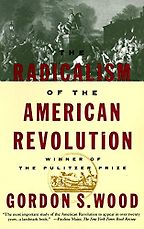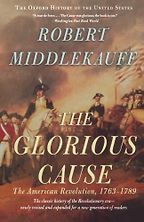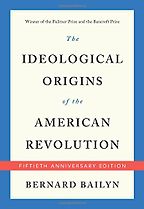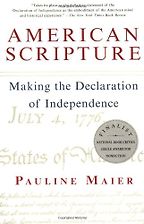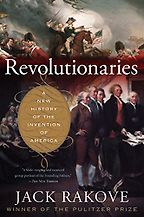Before we get to the books, the Fourth of July must be the most recognized of the United States’ national holidays. Nevertheless, since our readers are from all over the world and we all benefit from recalling the basics, please start us off by explaining what Americans celebrate on the Fourth of July?
The Fourth of July is our birthday. It’s the day when the Continental Congress declared the independence of the 13 colonies they represented. So that became the historic date of birth for the United States and everyone predicted that it would be celebrated for as long as the nation endured.
You’ve named four books that illuminate the Fourth of July and agreed to discuss your own work. Please begin by telling us about the book which won the 1993 Pulitzer Prize, The Radicalism of the American Revolution.
I wanted to stress that the Revolution’s emphasis on equality had consequences that went further than a simple colonial rebellion. In the decade or so following the Declaration of Independence, the former colonies became much more egalitarian. The declaration made the life, liberty and pursuit of happiness for ordinary people the goal of the new nation. The United States became a much more democratic, much more middle-class society. In that sense, the Revolution was much more radical than earlier analyses acknowledged.
“What, to the American slave, is your 4th of July?” Frederick Douglass famously asked, in an 1852 speech to a women’s anti-slavery society. He went on: “I answer; a day that reveals to him, more than all other days in the year, the gross injustice and cruelty to which he is the constant victim.” This statement is often interpreted as a rebuke to the founders. How do you interpret it?
Abraham Lincoln made the declaration into the principal document in American history. In his Gettysburg address, he invoked the declaration’s appeal to equality. “All men are created equal” was, for Lincoln, the central point of the document. He used those words to mobilize the North to continue fighting for the Union, despite the heavy casualties. Since then, the declaration’s appeal to equality has been a powerful touchstone. The Civil Rights Movement and the gay rights movement both invoked the declaration. Lincoln made the declaration into the rallying call for equality that it remains today.
The Glorious Cause is your next choice. How does this work, by Berkeley historian Robert Middlekauff, enhance our understanding?
The Glorious Cause is the first volume of the Oxford History of the United States, which Oxford University Press commissioned back in the 1950s, guided by Richard Hofstadter and C. Van Woodward. Middlekauff covers the military aspect of the Revolution. It is one of the best accounts of the war between the colonies and Great Britain.
If you declare independence, then you’ve got to fight for it. And the colonies were taking on the greatest military power in the world at the time. Great Britain had emerged from the Seven Years’ War as the greatest European power, having defeated both France and Spain. For the colonists to vanquish the British was a goal that was not easily achieved.
How does The Glorious Cause illuminate the Fourth?
July 4th would have been meaningless if the colonies had been defeated. After the colonists declared their independence, in 1776, they had to fight for it. That fight went on for eight years. The Revolution goes well beyond the military victory, but victory in the Revolutionary War was certainly a prerequisite to independence. Bob Middlekauff illuminates how the war was run and how the war was won.
The next book you named echoes this point. John Adams wrote, “What do We mean by the Revolution? The War? That was no part of the Revolution. It was only an Effect and Consequence of it.” Harvard historian Bernard Bailyn quotes him in his book, The Ideological Origins of the American Revolution, which won him his first Pulitzer Prize in 1968.
The Ideological Origins of the American Revolution is probably the most important book written about the Revolution. It was written over 50 years ago, but it still dominates the field. Bailyn outlines the ideas that justified the break from Great Britain. He puts it all together in the most succinct and powerful form.
The book was a departure from the economic interpretation of the American Revolution, identified with early 20th century economic historian Charles Beard. Bailyn describes his work as contextualist history, immersed in the details of the era. Isn’t that what history always is, or at least should be—based on actual documents and analysis of the context of the era?
History should be contextual, but not everyone is interested in context.
The first half of the 20th century was dominated by quasi-Marxist interpretations of history. Bailyn doesn’t deny the importance of economic factors, he simply doesn’t believe that economics explain all. Our lives are shaped by complicated forces, including ideas; so is our history.
Next you’ve named a book about the words whose declaration is celebrated on the Fourth of July. Please tell me about MIT historian Pauline Maier’s American Scripture.
American Scripture is the best book on the origins of the Declaration of Independence. Pauline Maier covers the subject as well as anyone ever did. She builds the context for the declaration.
Get the weekly Five Books newsletter
One important contribution Pauline Maier made was to show that the declaration wasn’t that original. She shows that preceding the actual writing of the declaration, there were about 80 or 90 declarations issued by small groups and colonies. She also points out that the draft by Jefferson was amended quite considerably by the Congress. Maybe 40 per cent of his draft was taken away and replaced.
I wanted to ask for your response to Pulitzer Prize-winning journalist Nikole Hannah-Jones’s assertion, in her introductory essay to The New York Times 1619 Project, referring to the Declaration of Independence: “The United States is a nation founded on both an ideal and a lie.”
The United States was founded on an ideal. As for the lie, I wouldn’t use that term. Hannah-Jones is referring, of course, to slavery. But there was slavery all over the world in 1776. Slavery had existed for thousands and thousands of years without substantial criticism. People in the eighteenth century, all over the world, took slavery and indentured labor for granted. The American Revolution, and its assertion that all men are created equal, created the first anti-slavery movement in the history of the world. The first meeting of anti-slavery advocates was held in Philadelphia in 1775. That’s not coincidental. The Revolution sparked an American anti-slavery movement.
“The Declaration of Independence, which is what we celebrate on the Fourth of July, is America’s saving grace because it is what holds us together”
The United States did not end slavery immediately, but they did end it in the North. Slavery in the North was not like in Virginia, where 40 per cent of society was enslaved or South Carolina, where 60 per cent of the population was enslaved. Nonetheless, at the time of the Revolution, slavery existed in the Northern colonies. 14 per cent of New York City was enslaved. 12 per cent of my own state of Rhode Island was enslaved. The Revolution and the declaration led to slavery being abolished in all of the Northern States by 1804. It was grandfathered in, but the legal support for slavery disappeared. That was a revolutionary development in human history. To argue otherwise is to ignore the context of the past.
In Empire of Liberty you wrote “The Civil War was the climax of a tragedy that was preordained from the time of the Revolution.”
That’s right. The Revolution created the anti-slavery movement. It took another 80 years to finally end slavery, with the Civil War. But in 1776, at lot of people thought that slavery would die a natural death. Indications of that in Virginia, for example, led many to the illusion that slavery would be wiped off of the United States map. We know they were wrong, therefore we indict them for not knowing the future; I think that’s the wrong way to write about history. But, nonetheless, that’s the mood we’re in right now and there is not much you can do about it, except to put the past in context.
Finally, Stanford historian Jack Rakove’s Revolutionaries: A New History of the Invention of America.
It’s a wonderfully readable book, focused on individual leaders. If you want to know how the Revolution occurred, this is a good book to start with.
What strikes me about it is its humble historiographical approach. It seems to concede the Revolution was wrought by many men, and they were mainly men, with mixed motives. Is that right? And what light does this bring to the Fourth?
I think that’s true. He shows how various individuals contributed to the Revolution. The Revolution was not just the work of a few, it was the work of a whole society.
Last question: the Fourth of July, as you noted, is a holiday that the United States has been marking since its founding. Currently, the United States is reevaluating its national holidays, considering getting rid of Columbus Day and recognizing Juneteenth a national holiday. As a historian, what do you feel is the value of the Fourth of July?
The Declaration of Independence, which is what we celebrate on the Fourth of July, is America’s saving grace because it is what holds us together. We’re a nation of many different people. We have no common ethnicity. We have no common religion. We have no common race. So, we need to keep honoring the one thing we have in common.
President Abraham Lincoln recognized, in an 1858 speech, that belief in the self-evident truths, “that all men are created equal, that they are endowed by their Creator with certain unalienable Rights, that among these are Life, Liberty and the pursuit of Happiness” is what makes us, as the first sentence of the declaration says, “one people.” We’ve got to celebrate that oneness, otherwise we’ll cease to be one nation altogether.
Interview by Eve Gerber
July 2, 2020. Updated: February 27, 2025
Five Books aims to keep its book recommendations and interviews up to date. If you are the interviewee and would like to update your choice of books (or even just what you say about them) please email us at [email protected]
Five Books interviews are expensive to produce. If you've enjoyed this interview, please support us by donating a small amount.
